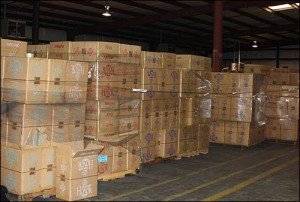
The FBI code named Major Case 253 “Operation Secondhand Smoke†– a case that brought down a network of schemers trafficking contraband cigarettes in of all places, Mississippi.
Working with the Bureau of Alcohol, Tobacco, Firearms, and Explosives (ATF), the Tupelo Police Department, and the Marshall County Sheriff’s Office in Mississippi, the FBI began an undercover investigation into a nationwide network of retailers, wholesalers, distributors, importers, and manufacturers who were avoiding cigarette taxes to make millions of dollars in profits.
“The amount of criminal activity in this case to avoid taxes was just phenomenal,†said Special Agent Carl Cuneo, one of the case supervisors based in the Oxford, Mississippi Resident Agency.
In the tobacco industry, the crime is known as “diverting,†and it applies to those who scheme to avoid the various federal and state taxes levied on cigarette sales. Operation Secondhand Smoke involved the so-called fourth-tier market, involving largely but off-label ones such as those manufactured in Armenia.
Taxes represent the majority of the total retail cost of a pack or carton of cigarettes. By illegally avoiding those taxes through schemes including hiding shipments from auditors and regulators and creating false invoices, bank, and tax records, crooks pocket the tax money they should have paid when the cigarettes were sold.
“Every time you avoid a tax, it’s pure profit,†Cuneo said. “You’re talking about as much as a million dollars of profit in just one tractor-trailer of diverted cigarettes.†The subjects in the case, six of which have pled guilty so far to a variety of federal charges, profited to the extent that they were able to purchase mansions, vacation properties, boats, and airplanes. “During the execution of just one search warrant,†Cuneo said, “we seized $12 million in cash and certificates of deposit. They just had it lying around.â€
In one 2009 warehouse raid, 28 truckloads of contraband cigarettes were seized worth an estimated $15-$20 million. This was detrimental to the criminals, but a windfall for authorities because pursuant to federal law, criminal seizures can be legally forfeited so that cash and property may be returned to victims of crimes or used by law enforcement.
Part of the property seized in Operation Secondhand Smoke was a 100,000-square-foot warehouse located in Tupelo, valued at $1.6 million. Because the Tupelo Police Department played an active role in the investigation from the beginning, that warehouse is in the process of being forfeited to the town, and will become the site of the department’s new headquarters. The Marshall County Sheriff’s Department, which took part in the investigation, stands to inherit as much $1 million from the forfeitures.
“We’re ecstatic about getting a new headquarters,†said Tony Carleton, chief of the Tupelo Police Department, a department that has 115 sworn officers. The city plans to demolish the old warehouse and build a new building.
Based partly on the relationships built between the Tupelo Police Department and the FBI during the Secondhand Smoke investigation, one of the newest members of our Joint Terrorism Task Force (JTTF) in Mississippi is a detective from the police department.
“This case really facilitated the relationship between the FBI and the police department,†Cuneo explained. “Everybody worked very hard on this investigation, and the partnerships are continuing to pay off.â€
